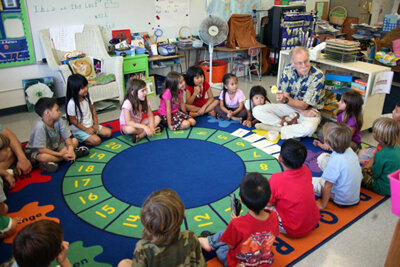By Amber Strong Makaiau, Chad Miller, and Sasha Himeno-Price
Dr. Thomas Jackson of p4c Hawaii guides students in building an intellectually safe community of inquiry.
It is with great pleasure that we write this inaugural post for our newly established blog, “Progressive Philosophy and Pedagogy: A Blog for Progressive Educators”. Designed to support the development of school communities that promote a better future society for today’s children, this online publication aims to further the worldwide progressive education movement by creating a collective thinkspace for progressive educators. Characterized by community, collaboration, diverse perspectives, social justice, the thoughtful exchange of ideas, inquiry, reflection, and informed action--this electronic publication will function as a cyber-commons of sorts. It is a place where progressive philosophers and practitioners, from across the globe, can connect through community and inquiry as they work together to carry out the movement’s important commitment to the intersection of democracy and education.
Just as Dewey envisioned the Laboratory School to be an enterprise built on cooperative relations--a community “dedicated to change, experimentation, and social reform” (Durst, 2010, p.9)--so is this blog. Well-poised to meet the demands of the COVID-19 pandemic recovery period, Progressive Philosophy and Pedagogy will amplify the voices of teachers, students, school leaders, philosophers, parents, and community members who are interested in cultivating and nurturing the promise and potential of the progressive education movement in the current moment and beyond. Brought together because of a shared interest in the art of dialogue and listening, the publication’s intention is to be both intellectual and relational. A 21st Century take on Dewey’s (1916) democratic “mode of associated living,” Progressive Philosophy and Pedagogy is “a conjoint communicated experience” (p. 87) striving to model the very best of human nature, including the ethos of a diverse, just, and equitable society.
It is for this reason that we want to close this first entry of the blog by establishing our community of inquiry as one that is intellectually safe.
“In an intellectually safe place there are no putdowns and no comments intended to belittle, undermine, negate, devalue, or ridicule. Within this place, the group accepts virtually any question or comment, so long as it is respectful of the other members of the circle. What develops is a growing trust among the participants and with it the courage to present one’s own thoughts, however tentative initially, on complex and difficult issues”
With that, we want to hear your thoughts!
Please consider contributing to “Progressive Philosophy and Pedagogy”. Learn more here. And follow us on Twitter @ProgressiveEdHI to join the conversation.
Let your voice be heard.
Momoe aku I mua -- move ahead with determination.
ABOUT THE AUTHORS:
Dr. Amber Strong Makaiau is a Specialist at the University of Hawaiʻi at Mānoa, Director of Curriculum and Research at the Uehiro Academy for Philosophy and Ethics in Education, Director of the Hanahau’oli School Professional Development Center, and Co-Director of the Progressive Philosophy and Pedagogy MEd Interdisciplinary Education, Curriculum Studies program. A former Hawai‘i State Department of Education high school social studies teacher, her work in education is focused around promoting a more just and equitable democracy for today’s children. Dr. Makaiau lives in Honolulu where she enjoys spending time in the ocean with her husband and two children.
Dr. Chad Miller is the 2012 Hawaiʻi Teacher of the Year, a National Board Certified teacher, and is currently a Specialist at the University of Hawaiʻi at Mānoa’s College of Education. Dr. Miller also serves as the Director of Teacher Development at the University’s Uehiro Academy for Philosophy and Ethics in Education and is the Co-Director of both the Progressive Philosophy and Pedagogy and National Board Certification Teacher Leader Curriculum Studies MEd programs. He also serves as a “Philosopher in Residence” at several public schools, where he supports K-12 teachers as they incorporate the activity of philosophy into their classroom practice. Dr. Miller and his ‘ohana live in Honolulu and love listening to punk rock, watching sports, and, most of all, being at the beach.
Sasha Himeno-Price is currently a Masters of Public Policy candidate at the Heller School of Social Policy and Management at Brandeis University. Her focus is in Child and Family policy, specifically education policy and increasing access to high-quality education. Outside of classes, Sasha enjoys spending time with her friends and family and walking Biskit, her recently adopted dog from the Humane Society.
Works Cited:
Dewey, J. (1916). Democracy and education: An introduction to the philosophy of education. New York: MacMillan.
Durst, A. (2010). John Dewey and the Beginnings of the Laboratory School. In A. Durst (Ed.), Women Educators in the Progressive Era: The Women behind Dewey’s Laboratory School (pp. 9–24). Palgrave Macmillan US. https://doi.org/10.1057/9780230109957_2
Jackson, T. (2001). The art and craft of “Gently Socratic” inquiry. In A. Costa (Ed.), Developing minds: A resource book for teaching thinking (3rd Ed). Alexandria, VA: Association for Supervision and Curriculum Development.






